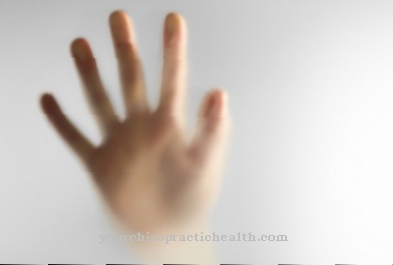depressions or chronic sadness (Latin: deprimere "to depress") is a state of mental depression. In psychiatry, depression is assigned to mood disorders. Depression can also occur in the course of other illnesses.
What is Depression?

Depression is a mental state characterized by seriously negative and depressed moods and aversion to any kind of activity. Depressed people feel sad, anxious, empty, hopeless, helpless, worthless, guilty, irritable, or restless. Most of these signs appear at the same time in depression and are so stressful for those affected that they feel sick and are very much restricted in their ability to act.
People who are depressed lose interest in activities, have very weak experiences and are often prone to loss of appetite or overeating, focus heavily on their real or perceived problems and often have difficulty making decisions. Depression can, in extreme cases, lead to a suicide attempt and a successful suicide.
Specialists in psychiatry are authorized to make a professional diagnosis of depression in Germany, most of whom are based on the international ICD classification system for mental and other diseases. To diagnose depression, certain characteristics must be present in certain forms. Mood swings must exceed a certain level and specific indicators must be available so that the doctor can diagnose major depression or bipolar disorder (the term "manic-depressive episode" used to be common here).
causes
At this point in time, science does not fully understand all the causes of depression because they are very complex. Nevertheless, a combination of different causes can be assumed. Biological factors, factors of developmental history, cognitive processing mechanisms and current events play the main role here.
It is still controversial whether the depression in many cases can clearly be traced back to a metabolic disorder in the brain. It is assumed here that messenger substances for the exchange of information in the brain regions cannot become sufficiently active. Doctors who tend to come from the field of depth psychology or cognitive behavioral therapy assume that depression in many cases is related to life changes or was learned over long periods.
According to this approach, depression is a sign of the psychological system that coping with life can only become effective again after a certain period of rest. With this approach of therapy for depression, this is interpreted as a necessary step in order to come to a new way of life.
You can find your medication here
➔ Medicines against depressive moods & to lighten the moodDiseases with this symptom
- Cardiovascular diseases
- cancer
- Dysthymia
- Irritable bowel syndrome
- Borderline syndrome
- Anxiety disorder
- Bipolar disorder
- stroke
- Burnout syndrome
- Affective disorders
- Cushing Syndrome
- eating disorder
- Menopause
- bulimia
- Ulcerative colitis
Complications
Depression can be associated with suicidality. The spectrum ranges from general thoughts about death to suicide fantasies, planning, preparation and carrying out suicide attempts. In the case of suicidality, hospitalization is indicated. The duration of the stay is very variable and depends on the individual case.
People with depression often suffer from concentration problems that hinder them in everyday life. Activities such as reading or watching TV can also be problematic. Motivational and volitional difficulties also contribute to impairments at work, at school or in training. Social complications related to friends and family are common; Depressive thought patterns can favor the development of conflicts. Regardless of this, people with depression often withdraw socially.
Cognitive disorders such as memory problems are also a possible complication of depression. These can take on the appearance of so-called pseudodementia. Patients show symptoms that are very similar to those of Alzheimer's and other dementias. Short-term memory is often more affected than long-term memory.
The effect of antidepressants can vary in strength from one person to another. Some patients experience slow improvement in symptoms or no improvement. For some people, the condition can worsen despite taking antidepressants.
In response to depression, some people develop other mental disorders, such as eating disorders.
When should you go to the doctor?
Depression can affect people of any age and is independent of social status, occupation or gender. The symptoms of depression can often be very unspecific and so the person often does not notice that they are already in a depressive phase. In many cases, the patients suffer from inexplicable complaints such as sadness, lack of drive, etc. It is usually family members or friends who notice the change in behavior and personality.
If these symptoms do not go away after a few days or weeks, the best method is to go to your doctor. The family doctor can then initiate the next steps for treatment. Especially when the person concerned can no longer find their way in everyday life, going to the family doctor or specialist is inevitable. However, patients are often ashamed to share their mental health problems with someone for fear of being stigmatized by society.
Persistent depression can also have a major impact on social life, making normal household chores and work impossible. The existence is then also endangered, because there is a risk of job loss or even the breakup of partnership or marriage. A stay in a clinic can save you from this difficult situation.
Doctors & therapists in your area
Treatment & Therapy
Self-treatment must be discouraged as the processes of depression are too diverse. Important treatment options are psychotherapy, behavior therapy, and the use of antidepressant medication. This can be used to treat depression quite successfully these days.
Depending on the approach, psychotropic drugs (antidepressants) or psychotherapy are used to treat depression. But there are also experts in depression who, depending on the situation, implement a combination therapy consisting of drugs and psychotherapy. In depression, psychotropic drugs can cause a change in the production of messenger substances in the brain. However, psychotropic drugs are not successful in all patients with depression, whereupon electroconvulsive therapy (ECT) can be used as a further therapy.
Psychotherapy for depression rather ensures that new behaviors can be learned in dealing with life changes. This therapy is more protracted but in many cases also more stable in the long term because new behaviors are learned that can build a protective barrier against future depression.
psychotherapy
The conversation between and therapist is decisive here. Psychotherapists, child and adolescent psychotherapists or medical psychotherapists are particularly suitable.
Outlook & forecast
In the case of depression, the further course of the disease with possible complications always depends on the severity of the depression. If these are in a very low stage relatively at the beginning, they can also disappear again on their own if they were triggered by negative events in life. When these events turn on the positive side, it can be relatively easy to fight against depression.
In the case of more severe problems and severe depression, a visit to a doctor or a psychologist is usually necessary. In most cases, discussions and therapies with the psychologist help here. In the case of severe depression, drugs must be used to contain it and to help the patient, especially in the early stages.
For the further course of the disease, the relationship with the friends and relatives of the patient is a very strong variable. You can provide a lot of help here to help the person affected and to free them from the negative thoughts that lead to depression.
If the depression is not treated, it can also have negative effects on living conditions. These include loss of work, anti-social behavior, and possibly even drug or alcohol addiction. In the worst case, the depression ends with suicidal thoughts or the suicide itself.
You can find your medication here
➔ Medicines against depressive moods & to lighten the moodprevention
Home remedies ↵ for depression It has long been known that some of the risk of depression is inherited.
Prevention of depression can therefore be useful if the family has had frequent suicides or serious physical illnesses. In these cases, cognitive behavioral therapy would be used as a preventative measure.
Here, those susceptible to depression learn to gain a more comprehensive view of their work and life situation. Depression can be prevented in such a way that those affected are given more options for action.
Situations that often lead to depression are reassessed and are therefore easier to cope with.
You can do that yourself
It helps many people with depression to have a clearly structured daily routine. Sensible getting up and sleeping times form the framework of the daily plan. Activity plans can help avoid too much idle time. The activities should be realistic and not overwhelming. In addition, it is advantageous if more strenuous and pleasant activities alternate.
Vitamin D can help improve symptoms. That is why sufficient daylight is of great importance for people suffering from depression. Getting up early in the morning and walking (for example half an hour a day) can help improve vitamin D levels.
Everyday exercise and sport are other ways to counteract depression in everyday life. Exercise promotes the release of dopamine and serotonin, which are neurotransmitters that play a central role in depression. Regular meals are also useful. If necessary, those affected can also set an alarm on their mobile phone so that they do not miss a meal. A balanced diet tends to have a positive effect on improving psychological symptoms.
The extent to which friends, family members or other people should be informed about the depression is individual. However, especially in the case of suicidality, self-harm or self-harm, it makes sense to initiate at least one trustworthy person and develop an emergency plan.
























.jpg)



